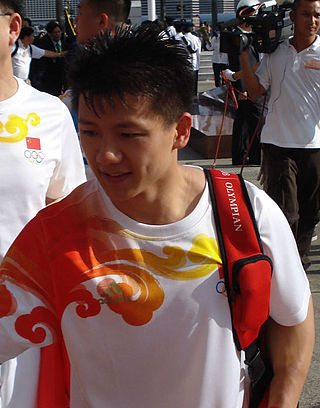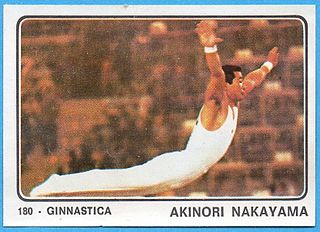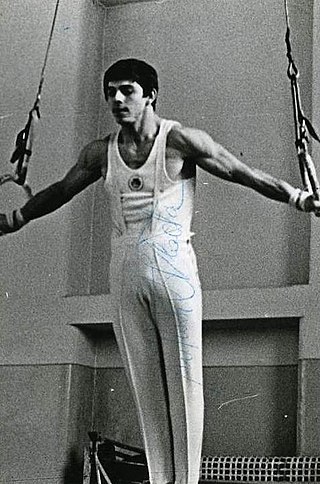
Chen Yibing is a Chinese gymnast, a four-time world champion on still rings. Chen was part of the Chinese team that won the gold medal in the team event at the World Artistic Gymnastics Championships in 2006, 2007, 2010 and 2011 and the Asian Games in 2006 and 2010. Since his international debut at the 2006 World Artistic Gymnastics Championships, he was almost unbeatable on his specialist event, still rings, except to his teammate Yan Mingyong in 2009 and the Brazilian Arthur Nabarrete Zanetti at the 2012 Summer Olympics. He became the 2006, 2007, 2010 and 2011 world champions on still rings.

The men's parallel bars competition was one of eight events for male competitors of the artistic gymnastics discipline contested in the gymnastics at the 2004 Summer Olympics in Athens. The qualification and final rounds took place on August 14 and August 23 at the Olympic Indoor Hall. There were 81 competitors from 31 nations, with nations competing in the team event having up to 5 gymnasts and other nations having up to 2 gymnasts. The event was won by Valeriy Honcharov of Ukraine, the nation's second victory in the parallel bars. Hiroyuki Tomita took silver, putting Japan above the Soviet Union on the all-time medal table for the event. Li Xiaopeng of China became the seventh man to win multiple parallel bars medals with his bronze adding to his 2000 gold.

The men's rings competition was one of eight events for male competitors of the artistic gymnastics discipline contested in the gymnastics at the 2004 Summer Olympics in Athens. The qualification and final rounds took place on August 14 and August 22 at the O.A.C.A. Olympic Indoor Hall. There were 77 competitors from 28 nations, with nations competing in the team event having up to 5 gymnasts and other nations having up to 2 gymnasts. The event was won by Dimosthenis Tampakos of Greece, the nation's first victory in the rings since 1896 and second overall. Yordan Yovchev of Bulgaria took silver, while Jury Chechi of Italy earned bronze. All three men had previously won a medal in the event; they were the 9th, 10th, and 11th men to win multiple rings medals.

The men's rings competition at the 2008 Summer Olympics was held on August 18 at the Beijing National Indoor Stadium. The eight competitors with the highest scores in qualifying proceeded to the men's rings finals. There, each gymnast performed again; the scores from the final round determined final ranking. There were 70 competitors from 25 nations that competed on the rings, with nations in the team event entering up to 5 gymnasts while other nations could enter up to 2. The event was won by Chen Yibing of China, the nation's first victory in the rings since 1984. Yang Wei, also of China, took silver. Bronze went to Oleksandr Vorobiov, the nation's first medal in the event.

The men's rings competition was one of eight events for male competitors in artistic gymnastics at the 2000 Summer Olympics in Sydney. The qualification and final rounds took place on September 16 and 24 at the Sydney Super Dome. There were 78 competitors from 29 nations; nations competing in the team event could have up to 5 gymnasts in the vault, while other nations could have up to 2 gymnasts. The event was won by Szilveszter Csollány of Hungary, the nation's first victory in the rings. Csollány, who had taken silver in 1996, became the eighth man to win multiple medals in the event. The silver this time went to Dimosthenis Tampakos of Greece—the first medal in the event for a Greek gymnast since 1896. Yordan Yovchev earned Bulgaria's first rings medal since 1960 with his bronze.

The men's rings competition was one of eight events for male competitors in artistic gymnastics at the 1996 Summer Olympics in Atlanta. The qualification and final rounds took place on July 20, 22 and 28th at the Georgia Dome. There were 102 competitors from 31 nations, with nations in the team event having up to 7 gymnasts and other nations having up to 3 gymnasts. The event was won by Jury Chechi of Italy, the nation's first victory in the men's rings since 1924 and first medal in the event since 1964. There was a tie for silver, between Szilveszter Csollány of Hungary and Dan Burincă of Romania. It was the best result so far for either nation; Romania had previously had a bronze medalist but this was Hungary's first trip to the podium in the rings.

The men's rings competition was one of eight events for male competitors in artistic gymnastics at the 1992 Summer Olympics in Barcelona. The qualification and final rounds took place on July 27, 29 and August 2 at the Palau dels Esports de Barcelona. There were 93 competitors from 25 nations, with nations in the team event having 6 gymnasts while other nations could have up to 3 gymnasts. The event was won by Vitaly Scherbo of the Unified Team, the fourth time in five Games that a Soviet or former Soviet gymnast won the rings. Li Jing of China earned silver. There was a tie for third, with Andreas Wecker of Germany and Li Xiaoshuang of China each receiving bronze medals. It was the first medal for unified Germany since 1936, though East Germany had won gold and bronze in 1988.

The men's parallel bars competition was one of eight events for male competitors in artistic gymnastics at the 1992 Summer Olympics in Barcelona. The qualification and final rounds took place July 27, 29 and August 2 at the Palau dels Esports de Barcelona. There were 93 competitors from 25 nations, with nations in the team event having 6 gymnasts while other nations could have up to 3 gymnasts. The event was won by Vitaly Scherbo of the Unified Team, the third time in four Games that a Soviet or former Soviet gymnast won the rings. Li Jing of China earned silver. There was a three-way tie for third, with Igor Korobchinski of the Unified Team, Guo Linyao of China, and Masayuki Matsunaga of Japan each receiving bronze medals. They were the first medals for China in the parallel bars.

The men's rings competition was one of eight events for male competitors in artistic gymnastics at the 1988 Summer Olympics in Seoul. The qualification and final rounds took place on September 18, 20, and 24th at the Olympic Gymnastics Hall. There were 89 competitors from 23 nations, with nations competing in the team event having 6 gymnasts and other nations having up to 3 gymnasts. For the second consecutive Games, the event ended in a way tie for first place. Dmitry Bilozerchev of the Soviet Union and Holger Behrendt of East Germany each received a gold medal. It was East Germany's first medal in the rings. The Soviets had had an eight-Games medal streak in the event snapped by their boycott of the 1984 Games; Bilozerchev's medal put the nation back on the podium after that one-Games absence. Sven Tippelt, also of East Germany, took bronze.

The men's rings competition was one of eight events for male competitors in artistic gymnastics at the 1972 Summer Olympics in Munich. The qualification and final rounds took place on August 27, 29 and September 1 at the Olympiahalle. There were 111 competitors from 26 nations ; nations entering the team event had 6 gymnasts while other nations could have up to 3 gymnasts. The top two places were the same as in 1968, while the next two places were taken by the same gymnasts but in the opposite order. The event was won by Akinori Nakayama of Japan, the nation's third consecutive victory in the men's rings; Nakayama was the second man to successfully defend an Olympic title in the event. Mikhail Voronin's second consecutive silver extended the Soviet Union's podium streak in the rings to six Games. Nakayama and Voronin were the fifth and sixth men to earn multiple medals in the rings. Mitsuo Tsukahara of Japan took bronze, switching places with fourth-place finisher Sawao Kato from the previous Games.

The men's horizontal bar competition was one of eight events for male competitors in artistic gymnastics at the 1976 Summer Olympics in Montreal. The qualification and final rounds took place on July 18, 20, and 23rd at the Montreal Forum. There were 90 competitors from 20 nations, with nations competing in the team event having 6 gymnasts while other nations could have up to 3 gymnasts. The event was won by Mitsuo Tsukahara of Japan, the second man to successfully defend an Olympic title in the horizontal bar. It was the third consecutive victory by a Japanese gymnast in the event, and fifth in six Games. Japan also took silver, as Eizo Kenmotsu finished second, but was prevented from repeating its 1972 podium sweep by new rules that limited nations to two gymnasts in the final. Tsukuhara and Kenmotsu were the seventh and eighth men to win multiple medals in the horizontal bar. Henri Boerio of France and Eberhard Gienger of West Germany tied for bronze, the first medal for France in the event since 1924 and first horizontal bar medal for West Germany.

The men's rings competition was one of eight events for male competitors in artistic gymnastics at the 1976 Summer Olympics in Montreal. The qualification and final rounds took place on July 18, 20, and 23rd at the Montreal Forum. There were 90 competitors from 20 nations, with nations competing in the team event having 6 gymnasts while other nations could have up to 3 gymnasts. The event was won by Nikolai Andrianov of the Soviet Union, the nation's first victory in the rings since 1960. Another Soviet gymnast, Alexander Dityatin, took silver. The Soviet podium streak in the event reached seven Games. Dan Grecu earned Romania's first medal in the rings. Japan's three-Games gold medal streak and five-Games podium streak in the event ended as the nation's best results were fifth and sixth places.

The men's pommel horse competition was one of eight events for male competitors in artistic gymnastics at the 1980 Summer Olympics in Moscow. The qualification and final rounds took place on July 20, 22 and 25 at the Luzhniki Palace of Sports. There were 65 competitors from 14 nations, with nations competing in the team event having 6 gymnasts while other nations could have to up to 3 gymnasts. The event was won by Zoltán Magyar of Hungary, the third man to successfully defend an Olympic title in the pommel horse. Silver went to Alexander Dityatin, extending the Soviet Union's podium streak in the event to eight Games. Michael Nikolay of East Germany took bronze for the second consecutive Games. Magyar and Nikolay were the sixth and seventh men to earn multiple pommel horse medals.

The men's rings competition was one of eight events for male competitors in artistic gymnastics at the 1980 Summer Olympics in Moscow. The qualification and final rounds took place on July 20, 22 and 25th at the Luzhniki Palace of Sports. There were 65 competitors from 14 nations, with nations competing in the team event having 6 gymnasts while other nations could have to up to 3 gymnasts. The event was won by Alexander Dityatin of the Soviet Union, the nation's fifth victory in the rings, with fellow Soviet Aleksandr Tkachyov taking silver. It was the second consecutive Games that the Soviet Union had the top two men in the rings. Dityatin, the silver medalist in Montreal 1976, was the seventh man to win multiple medals in the rings. Jiří Tabák earned Czechoslovakia's first medal in the event since 1948.

The men's individual all-around competition was one of eight events for male competitors in artistic gymnastics at the 1980 Summer Olympics in Moscow. The qualification and final rounds took place on July 20, 22 and 24th at the Sports Palace of the Central Lenin Stadium. There were 65 competitors from 14 nations. Each nation could enter a team of 6 gymnasts or up to 3 individual gymnasts. The event was won by Alexander Dityatin of the Soviet Union, the nation's second consecutive and fifth overall victory in the event. It was the second of Dityatin's 8 total medals in 1980, a record that still stands through the 2016 Games. Dityatin's teammate, defending gold medalist Nikolai Andrianov, finished with the silver medal. Andrianov was the 10th man to win multiple medals in the event; he would also finish the 1980 Games with a total of 15 medals over all years—most among men at the time. Bronze went to Stoyan Deltchev of Bulgaria—the first medal in the event by a gymnast not from the Soviet Union or Japan since 1952. It was Bulgaria's first-ever medal in the men's all-around. Japan, which had joined the American-led 1980 Summer Olympics boycott and did not compete, had its six-Games podium streak ended.

Bulgaria competed at the 2012 Summer Olympics in London, United Kingdom from 27 July to 12 August 2012. It was the nation's nineteenth appearance at the Summer Olympics, having missed the Olympics on three occasions, including the 1984 Summer Olympics in Los Angeles because of the Soviet boycott. Despite this being London's third Olympic Games, this was the first time a Bulgarian team appeared at a London Olympics. The Bulgarian Olympic Committee sent the nation's smallest delegation to the Games, tying the record with Helsinki in 1952, and with Tokyo in 1964. A total of 63 athletes, 36 men and 27 women, competed in 16 sports. Men's volleyball was the only team event in which Bulgaria was represented in these Olympic games. There was only a single competitor in badminton, sprint canoeing, fencing, and judo.

Arthur Nabarrete Zanetti is a Brazilian artistic gymnast. He won the gold medal in the rings exercise at the 2012 Summer Olympics in London and at the 2013 World Artistic Gymnastics Championships in Antwerp.

The men's pommel horse competition at the 2016 Summer Olympics was held at the HSBC Arena on 6 and 14 August. There were 71 competitors from 36 nations. The event was won by Max Whitlock of Great Britain, the nation's first gold medal in the men's pommel horse. The nation finished 1–2 in the event, with Louis Smith repeating as silver medalist. It was the first time any nation had earned the top two spots in the event since the Soviet Union swept the medals in 1952. Smith was the second man to win three medals in the event, while Whitlock was the 11th to win two medals.

The men's rings competition at the 2016 Summer Olympics was held at the HSBC Arena on 6 and 15 August. There were 70 competitors from 34 nations. The event was won by Eleftherios Petrounias of Greece, the nation's first medal in the men's rings since 2004. Defending champion Arthur Zanetti of Brazil finished second, making him the 13th man to win multiple medals in the event. Denis Ablyazin earned Russia's first post-Soviet medal in the event with his bronze.

The men's parallel bars competition at the 2016 Summer Olympics was held at the HSBC Arena on 16 August. There were 67 competitors from 33 nations. The event was won by Oleg Verniaiev of Ukraine, the nation's first victory in the parallel bars since 2004 and third overall. Danell Leyva won the United States' first medal in the event since 1996 with his silver; David Belyavskiy's bronze was Russia's first medal in the parallel bars since 2000. China's four-Games podium streak in the event ended.

















